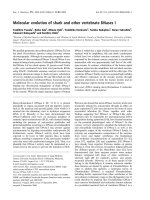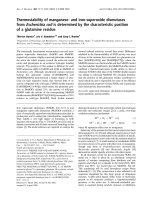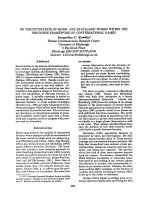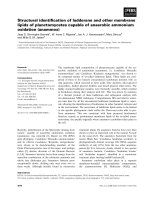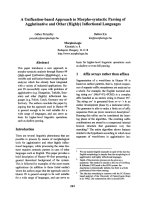The meaning of tingo and other extraordinary words from around the world
Bạn đang xem bản rút gọn của tài liệu. Xem và tải ngay bản đầy đủ của tài liệu tại đây (2.33 MB, 223 trang )
PENGUIN BOOKS
THE MEANING OF TINGO
Adam Jacot de Boinod first acquired his vokabulyu
(Russian—
“passion for foreign words”) while working as a researcher for
the BBC program QI. While searching through 280 dictionaries,
140 Web sites, and innumerable books on language, he devel-
oped a textbook case of samlermani
(Danish—“mania for col-
lecting”), became close to being f
issilig (German—“flustered to
the point of incompetence”), and narrowly avoided karoshi
(Japanese—“death from overwork”). He is now intending to
nglayap (Indonesian—“wander far from home with no particu-
lar purpose”), but for the moment lives in London.
!
!
af!Nfbojoh!!
pg!Ujohp
b
o
e
!
p
u
i
f
s
!
F
y
u
s
b
p
s
e
j
o
b
s
z
!
X
p
s
e
t
!
g
s
p
n
!
b
s
p
v
o
e
!
u
i
f
!
X
p
s
m
e
!DAMþ*ACOTþDEþ"OINOD
penguin books
PENGUIN BOOKS
Published by the Penguin Group
Penguin Group (USA) Inc., 375 Hudson Street, New York, New York 10014, U.S.A.
Penguin Group (Canada), 90 Eglinton Avenue East, Suite 700, Toronto,
Ontario, Canada M4P 2Y3 (a division of Pearson Penguin Canada Inc.)
Penguin Books Ltd, 80 Strand, London WC2R 0RL, England
Penguin Ireland, 25 St Stephen’s Green, Dublin 2, Ireland (a division of Penguin Books Ltd)
Penguin Group (Australia), 250 Camberwell Road, Camberwell,
Victoria 3124, Australia (a division of Pearson Australia Group Pty Ltd)
Penguin Books India Pvt Ltd, 11 Community Centre,
Panchsheel Park, New Delhi – 110 017, India
Penguin Group (NZ), 67 Apollo Drive, Mairangi Bay, Auckland 1311,
New Zealand (a division of Pearson New Zealand Ltd.)
Penguin Books (South Africa) (Pty) Ltd, 24 Sturdee Avenue,
Rosebank, Johannesburg 2196, South Africa
Penguin Books Ltd, Registered Offices: 80 Strand, London WC2R 0RL, England
First published in Great Britain by Penguin Books Ltd 2005
First published in the United States of America by The Penguin Press,
a member of Penguin Group (USA) Inc. 2006
Published in Penguin Books (UK) 2006
Published in Penguin Books (USA) 2007
Copyright © Adam Jacot de Boinod, 2005
Illustrations copyright © Sandra Howgate, 2005
All rights reserved
THE LIBRARY OF CONGRESS HAS CATALOGED THE HARDCOVER EDITION AS FOLLOWS:
Jacot de Boinod, Adam.
The meaning of tingo and other extraordinary words from
around the world / Adam Jacot de Boinod.
p. cm.
1. Language and languages—Foreign words and phrases. I. Title.
P326.J33 2006
418—dc22 2005055520
Set in Swift
Designed by Andrew Barker
The scanning, uploading and distribution of this book via the Internet or via any other means
without the permission of the publisher is illegal and punishable by la
w. Please purchase only
authorized electronic editions, and do not participate in or encourage electronic piracy
of copyrighted materials. Your support of the author’s rights is appreciated.
ISBN: 1-4295-3113-4
Contents
Foreword vii
Acknowledgements xi
Meeting and Greeting 1
From Top to Toe 13
Movers and Shakers 29
Getting Around 39
It Takes All Sorts 45
Falling in Love 61
The Family Circle 75
Clocking On 87
Time O◊ 101
Eating and Drinking 113
Below Par 125
From Cradle to Grave 131
Otherworldly 143
All Creatures Great and Small 149
Whatever the Weather 163
Hearing Things 171
Seeing Things 179
Number Crunching 185
What’s in a Name? 201
ebooksdownloadrace.blogspot.in
Foreword
My interest in the quirkiness of foreign words was triggered when
one day, working as a researcher for the BBC quiz programme QI,
I picked up a weighty Albanian dictionary to discover that they have
no fewer than twenty-seven words for eyebrows and the same
number for moustache, ranging from
mustaqe madh, or bushy, to
a
mustaqe posht, one which droops down at both ends.
My curiosity rapidly grew into a passion. I was soon unable to go
near a second-hand bookshop or library without seeking out the
shelves where the foreign language dictionaries were kept. I would
viii Foreword
scour books in friends’ houses with a similar need to ‘pan for
gold’. My collection of wonderful words with no equivalent in the
English language grew even longer, and I started to make a shortlist
of my favourites:
nakhur, for example, is a Persian word (which
may not even be known to most native speakers) meaning ‘a camel
that won’t give milk until her nostrils have been tickled’; and
areodjarekput, the Inuit for ‘to exchange wives for a few days only’.
Many described strange or unbelievable things. When and why, for
example, would a man be described as a
marilopotes, Ancient Greek
for ‘a gulper of coaldust’? And could the Japanese samurai really have
used the verb
tsuji-giri, meaning ‘to try out a new sword on a
passer-by’?
Others expressed concepts that seemed all too familiar. We have
all met a
Zechpreller, the German description of ‘someone who
leaves without paying the bill’; spent too much time with an
ataoso,
Central American Spanish for ‘one who sees problems with every-
thing’; or worked with a
neko-neko, Indonesian for ‘one who has a
creative idea which only makes things worse’.
My passion became a quiet obsession. I combed through over two
million words in hundreds of dictionaries. I trawled the Internet,
phoned Embassies, and tracked down foreign language speakers
who could confirm my findings. I discovered that not everything
sounds the same the world over: in Afrikaans, frogs go
kwaak-
kwaak
, in Mexico cats go tlatzomia, while in Germany the noise
of Rice Crispies’ snap, crackle and popping is
Knisper! Knasper!
Knusper!
I found beautiful words to describe things for which we have no
concise expression in English, like
serein, the French for ‘the
rain that falls from a cloudless sky’; or
wamadat, Persian for ‘the
intense heat of a sultry night’. I found words for all stages of life,
from
paggiq, Inuit for ‘the flesh torn when a woman delivers a baby’,
through
Torschlusspanik, German for ‘the fear of diminishing
opportunities as one gets older’, to mingmu, Chinese for ‘to die
without regret’. I savoured the direct logic of Danish, the succinct-
ness of Malay, the sheer wackiness of Japanese, and realized that
sometimes a dictionary can tell you more about a culture than a
guidebook.
I looked at languages from all corners of the world, from the
Fuegian of southernmost Chile to the Inuit of northernmost Alaska,
and from the Maori of the remote Cook Islands to Siberian Yakut.
Some of them describe, of course, strictly local concepts and sensa-
tions, such as the Hawaiian
kapau’u, ‘to drive fish into the waiting
net by striking the water with a leafy branch’; or
pukajaw, Inuit for
‘firm snow that is easy to cut and provides a warm shelter’. But others
reinforce the commonality of human experience. Haven’t we all felt
termangu-mangu, Indonesian for ‘sad and not sure what to do’ or
mukamuka, Japanese for ‘so angry one feels like throwing up’?
Most reassuring is to find the thoughts that lie on the tip of an
English tongue, here crystallized into vocabulary: from the Zambian
language of Bemba
sekaseka, ‘to laugh without reason’, through the
Czech
nedovtipa, ‘one who finds it difficult to take a hint’, to the
Japanese
bakku-shan, ‘a woman who appears pretty when seen from
behind but not from the front’.
The English language has a long-established and voracious ten-
dency to naturalize the best foreign words:
ad hoc, feng shui,
croissant, kindergarten. We’ve been pinching words from other
cultures for centuries. Here are some we missed. I hope you enjoy
them as much as I do.
Adam Jacot de Boinod
ix Foreword
x Foreword
I’ve done my best to check the accuracy of all the terms but if you
have any suggestions for changes (and, of course, I’d love to know
of your own favourite foreign words) do please send them in to my
website:
www.themeaningoftingo.com.
Acknowledgements
I am deeply grateful to the following people for their advice and help:
Giles Andreae, Martin Bowden, David Buckley, Candida Clark, Anna
Coverdale, Nick Emley, Natasha Fairweather, William Hartston,
Beatrix Jacot de Boinod, Nigel Kempner, Nick and Galia Kullmann,
Alf Lawrie, John Lloyd, Sarah McDougall, Yaron Meshoulam, Tony
Morris, David Prest, David Shariatmadari and Christopher Silvester.
In particular I must thank my agent, Peter Straus; my illustrator
Sandra Howgate; my excellent editorial team at Penguin, Nigel
Wilcockson, Georgina Laycock and Sophie Lazar; and Mark McCrum
for his invaluable work on the text.
Meeting and Greeting
ai jiao de maque bu zhang rou
(Chinese)
sparrows that love to chirp won’t put on
weight
2 The Meaning of Tingo
¡Hola!
T
he first and most essential word in all languages is surely ‘hello’,
the word that enables one human being to converse with another:
aa (Diola, Senegal)
beeta (Soninke, Mali, Senegal and Ivory Coast)
bok (Croatian)
boozhoo (Ojibwe, USA and Canada)
daw-daw (Jutlandish, Denmark)
ella (Awabakal, Australia)
i ay (Huaorani, Ecuador)
khaumykhyghyz (Bashkir, Russia)
nark (Phorhépecha, Mexico)
rozhbash (Kurdi, Iraq and Iran)
samba (Lega, Congo)
wali-wali (Limbe, Sierra Leone)
xawaxan (Toltichi Yokuts, California, USA)
yoga (Ateso, Uganda)
yoyo (Kwakiutl, Canada)
But it may not even be a word. In the Gilbert Islands of the Pacific,
arou pairi describes the process of rubbing noses in greeting. For
the Japanese, bowing is an important part of the process and a sign
of respect: ojigi is the act of bowing; eshaku describes a slight bow
(of about 15 degrees);
keirei, a full bow (of about 45 degrees); while
saikeirei is a very low, worshipful type of bow that involves the nose
nearly touching the hands. When one meets someone extremely
important, one might even consider
pekopeko, bowing one’s head
repeatedly in a fawning or grovelling manner.
Just say the word
S
ometimes a single word works hard. In Sri Lanka, for example, the
Sinhala word
ayubowan means not only ‘good morning’, but also
‘good afternoon’, ‘good evening’, ‘good night’ and ‘goodbye’.
Expectant
T
he frustration of waiting for someone to turn up is beautifully
encapsulated in the Inuit word
iktsuarpok, meaning ‘to go outside
often to see if someone is coming’. As for the frustration of the caller,
there’s always the Russian
dozvonit’sya which doesn’t simply mean
to ring a doorbell, but to ring it until one gets an answer (it’s also
used for getting through on the telephone).
3 Meeting and Greeting
4 The Meaning of Tingo
Hey you!
O
nce the first encounter is out of the way the correct form of
address is important. Most of us know the difference between the
intimate French
tu and the more impersonal (and polite) vous.
A similar distinction exists in Arabic between
anta (‘you’ singular)
and
antum (‘you’ plural) – addressing an important person with
anta (anti is the feminine version) rather than antum would be
considered impolite.
In Vietnam there are no fewer than eighteen words for ‘you’, the
use of which depends on whom you are addressing, whether a
child or a senior citizen, whether formally or informally. And in the
Western Australian Aboriginal language of Jiwali there are four
words for ‘we’:
ngali means ‘we two including you’; ngaliju means
‘we two excluding you’;
nganthurru means ‘we all including you’;
and
nganthurraju means ‘we all excluding you’.
Cripes!
E
xclamations are generally used to express a sudden reaction: to
something frightening, incredible, spectacular, shocking or wonder-
ful. Best not attempted by the visitor, they are better heard from the
mouth of the native speaker than read off the page:
aaberdi (Algerian) a cry used when learning fearful news
aawwaah (Dardja, Algeria) a shout of doubt or hesitation
aãx (Karuk, North America) how disgusting!
aduh (Malay) ouch or wow!
aduhai (Indonesian) an expression of admiration
alaih (Ulwa, Nicaragua) gosh! goodness! help!
alalau (Quechuan, Peru) brrr! (of cold)
amit-amit (Indonesian) forgive me!
ammazza (Italian) it’s a killer! wow!
asshe (Hausa, Nigeria) a cry of grief at distressing news
bambule (Italian) cheers! (preceding the lighting of a joint)
cq (Albanian) a negative exclamation of mild disappointment
hoppla (German) whoops!
naa (Japanese) that’s great!
nabocklish (Irish Gaelic) don’t meddle with it!
oho (Hausa, Nigeria) I don’t care
oop (Ancient Greek) a cry to make rowers stop pulling
sa (Afrikaans) catch him!
savul (Turkish) get out of the way!
schwupp (German) quick as a flash
shahbash (Anglo-Indian) well done! (or well bowled!, as said in
cricket by a wicket-keeper to the bowler)
tao (Chinese) that’s the way it goes
taetae tiria (Cook Islands Maori) throw it away, it’s dirty!
uf (Danish) ugh! yuk!
usch då (Swedish) oh, you poor thing!
y-eazziik (Dardja, Algeria) an expression used exclusively by
women to criticize another person’s action
zut (French) dash it!
Chinwag
T
he niceties of what in English is baldly known as ‘conversation’ are
well caught in other languages:
ho’oponopono (Hawaiian) solving a problem by talking it out
samir (Persian) one who converses at night by moonlight
begadang (Indonesian) to stay up all night talking
glossalgos (Ancient Greek) talking till one’s tongue aches
5 Meeting and Greeting
6 The Meaning of Tingo
Breakdown in communication
W
hether the person you are talking to suffers from latah (Indones-
ian), the uncontrollable habit of saying embarrassing things, or from
chenyin (Chinese), hesitating and muttering to oneself, conversation
may not always be quite as we’d like it:
catra patra (Turkish) the speaking of a language incorrectly
and brokenly
nyelonong (Indonesian) to interrupt without apology
akkisuitok (Inuit) never to answer
dui niu tanqin (Chinese) to talk over someone’s head or
address the wrong audience (literally, to play the lute to a
cow)
’a’ama (Hawaiian) someone who speaks rapidly, hiding their
meaning from one person whilst communicating it to
another
dakat’ (Russian) to keep saying yes
dialogue de sourds (French) a discussion in which neither
party listens to the other (literally, dialogue of the deaf)
mokita (Kiriwana, Papua New Guinea) the truth that all know
but no one talks about
Tittle-tattle
G
ossip – perhaps more accurately encapsulated in the Cook Island
Maori word
’o’onitua, ‘to speak evil of someone in their absence’ – is
a pretty universal curse. But it’s not always unjustified. In Rapa Nui
(Easter Island)
anga-anga denotes the thought, perhaps groundless,
that one is being gossiped about, but it also carries the sense that this
may have arisen from one’s own feeling of guilt. A more gentle form
of gossip is to be found in Jamaica, where the patois word
labrish
means not only gossip and jokes, but also songs and nostalgic
memories of school.
False friends
T
hose who learn languages other than their own will
sometimes come across words which look or sound the
same as English, but mean very different things. Though
a possible source of confusion, these false friends (as
linguists call them) are much more likely to provide
humour – as any Englishwoman who says ‘bless’ to her
new Icelandic boyfriend will soon discover:
hubbi (Arabic) friendly
kill (Arabic) good friend
bless (Icelandic) goodbye
no (Andean Sabela) correct
aye (Amharic, Ethiopia) no
fart (Turkish) talking nonsense
machete (Aukan, Suriname) how
7 Meeting and Greeting
8 The Meaning of Tingo
÷e unspeakable . . .
C
ursing and swearing are practised worldwide, and they generally
involve using the local version of a small set of words describing an
even smaller set of taboos that surround God, the family, sex and the
more unpleasant bodily functions. Occasionally, apparently inoffen-
sive words acquire a darker overtone, such as the Chinese
wang bah
dahn
, which literally means a turtle egg but is used as an insult for
politicians. And offensive phrases can often be beguilingly inventive:
zolst farliren aleh tseyner achitz eynm, un dos zol dir vey
ton
(Yiddish) may you lose all your teeth but one and may
that one ache
así te tragues un pavo y todas las plumas se conviertan
en cuchillas de afeitar
(Spanish) may all your turkey’s
feathers turn into razor blades
. . . the unmentionable
T
aboo subjects, relating to local threats or fears, are often quirky in
the extreme. Albanians, for example, never use the word for ‘wolf ’.
They say instead
mbyllizogojen, a contraction of a sentence mean-
ing
‘may God close his mouth’. Another Albanian taboo-contraction is
the word for fairy,
shtozovalle, which means may ‘God increase
their round-dances’. Similarly, in the Sami language of Northern
Scandinavia and the Yakuts language of Russia, the original name
for bear is replaced by a word meaning ‘our lord’ or ‘good father’.
In Russian itself, for similar reasons, a bear is called a
medved’ or
‘honey-eater’.
. . . and the unutterable
I
n Masai the name of a dead child, woman or warrior is not spoken
again and, if their name is also a word used every day, then it is no
longer used by the bereaved family. The Sakalavas of Madagascar do
not tell their own name or that of their village to strangers to prevent
any mischievous use. The Todas of Southern India dislike uttering
their own name and, if asked, will get someone else to say it.
Shocking soundalikes
T
he French invented the word ordinateur, supposedly in order to
avoid using the first two syllables of the word computer (
con is slang
for vagina and
pute for whore). Creek Indians in America avoid their
native words for earth (
fakki) and meat (apiswa) because of their
resemblance to rude English words.
In Japan, four (
shi) and nine (ku) are unlucky numbers, because
the words sound the same as those for ‘death’ and ‘pain or worry’
respectively. As a result, some hospitals don’t have the numbers 4, 9,
14, 19, or 42 for any of their rooms. Forty-two (
shi-ni) means to die,
420 (
shi-ni-rei) means a dead spirit and 24 (ni-shi) is double death.
Nor do some hospitals use the number 43 (
shi-zan), especially in the
maternity ward, as it means stillbirth.
9 Meeting and Greeting
Fare well
M
any expressions for goodbye offer the hope that the other person
will travel or fare well. But it is not always said.
Yerdengh-nga
is a Wagiman word from Australia, meaning ‘to clear off without
telling anyone where you are going’. Similarly, in Indonesia,
ming-
gat
means ‘to leave home for good without saying goodbye’.
Snobs and chau◊eurs
W
ords don’t necessarily keep the same meaning. Simple
descriptive words such as ‘rain’ or ‘water’ are clear and
necessary enough to be unlikely to change. Other more
complex words have often come on quite a journey since
they were first coined:
On reflection
al-kuhul (Arabic) originally, powder to darken the
eyelids; then taken up by alchemists to refer to any
fine powder; then applied in chemistry to any refined
liquid obtained by distillation or purification,
especially to alcohol of wine, which then was
shortened to alcohol
chauffer (French) to heat; then meant the driver of an
early steam-powered car; subsequently growing to
chauffeur
10 The Meaning of Tingo
An Arabian goodbye
I
n Syrian Arabic, goodbye is generally a three-part sequence: a) bxa-
trak
, by your leave; b) ma’assalama, with peace; c) ’allaysallmak,
God keep you. If a) is said first, then b) is the reply and then c) may be
used. If b) is said first, then c) is obligatory.
hashhashin (Arabic) one who smokes or chews hashish;
came to mean assassin
manu operare (Latin) to work by hand; then narrowed
to the act of cultivating; then to the dressing that was
added to the soil, manure
prestige (French) conjuror’s trick; the sense of illusion
gave way to that of glamour which was then
interpreted more narrowly as social standing or
wealth
sine nobilitate (Latin) without nobility; originally
referred to any member of the lower classes; then to
somebody who despised their own class and aspired to
membership of a higher one; thus snob
theriake (Greek) an antidote against a poisonous bite;
came to mean the practice of giving medicine in sugar
syrup to disguise its taste; thus treacle
11 Meeting and Greeting



